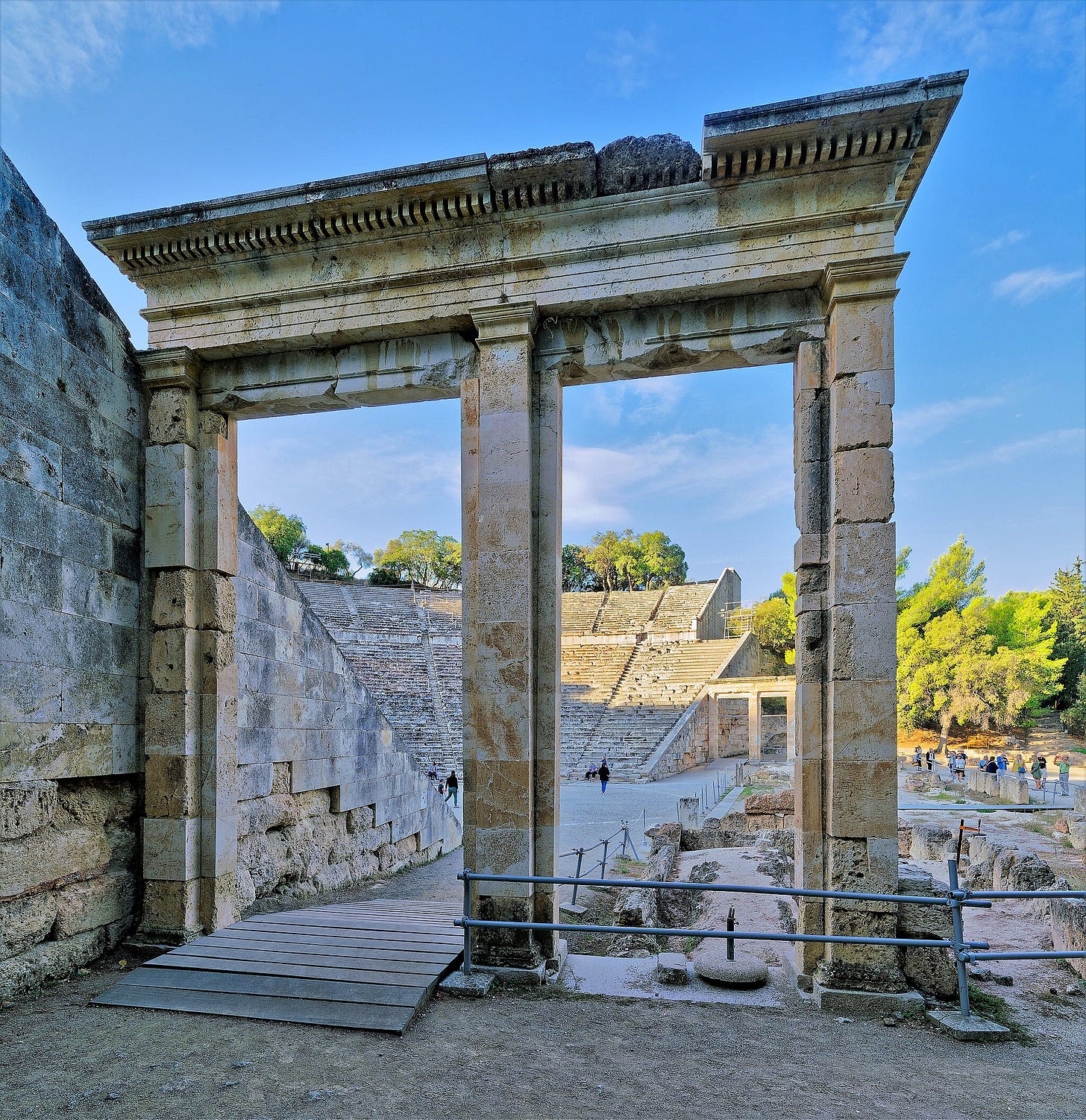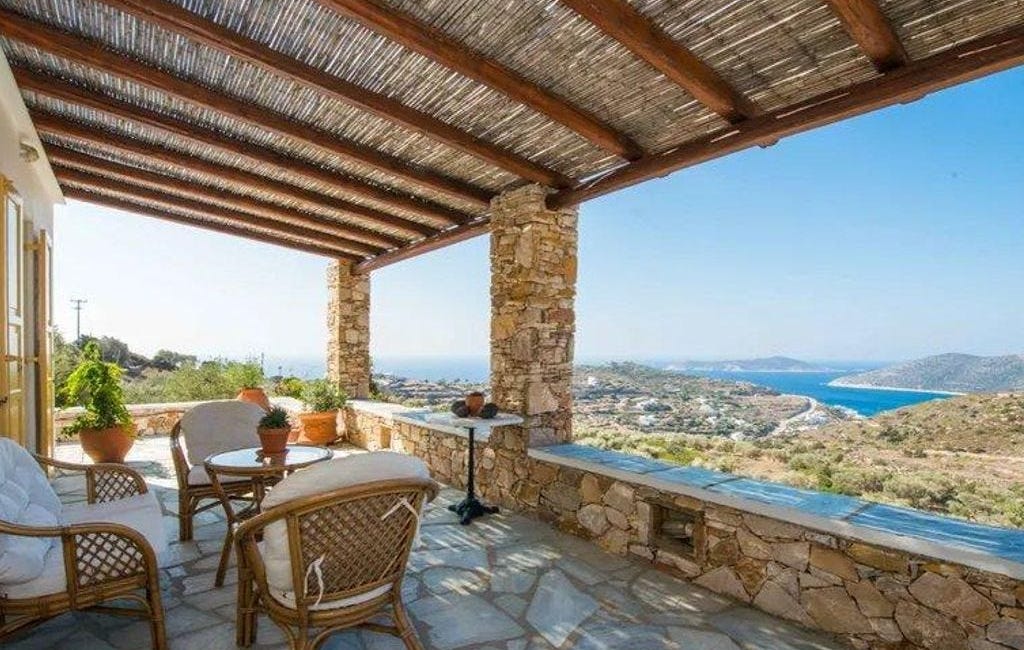For over 20 years we’ve been coming to Athens and exploring Greece. But we have never been here during the summer months . . . until now. And all one has to do is take a look at the temperatures from June to September to see why we invariably visit in the winter and spring! However, this summer’s surprise trip to Athens did offer us a rare opportunity — the chance to make the arduous round-trip journey to the sacred Ancient Theater of Epidaurus to see a play for its annual festival of theater and music. But not just any play. This year, we had the great fortune to get 18th-row tickets to see Euripides’ The Bacchae.

Euripides’ last known surviving play, this work holds a special place in my heart. Not only is the play about the ultimate Epicurean — the God of wine himself, Dionysus — it’s also one of the first plays I longed to stage as a young theater major in college. My focus of study was on what was then termed “Styles Theater,” from Absurdism to Commedia dell'arte to classic Greek theater. And perhaps my greatest passion was for Greek theater, specifically the tragedies of Aeschylus, Sophocles and Euripides.
The chance to see a play at the most well-preserved ancient Greek theater, renowned for having the most perfect acoustics and aesthetics, was a dream come true for me. The theater was constructed in the 4th century BCE at the sanctuary of Asclepius, the Greek God of medicine. Seating up to 14,000 spectators, the theater presented music and plays that were a part of the worship of Asclepius and, consequently, it was believed that the catharsis derived from attending these performances had healing effects on one’s mental and physical health.

And as fate would have it, we actually came to Athens specifically seeking treatment for some rather difficult physical ailments I’ve been struggling with over the last year (diverticulitis and a severely herniated disc to be specific, but I’ll spare you all the graphic details). So this opportunity seemed like a perfect accompaniment to the amazing care I have been receiving so far in Greece. Now we just had to figure out how to get to Epidaurus from Athens!
We began doing some research on our pilgrimage to Epidaurus. The theater is about an hour-and-a-half drive from Athens by car. But if you’ve ever driven in Athens, you’d know that you could be taking your life in your own hands (literally). Then we discovered that there was a bus that takes you directly to the theater, picks you up after the play, and returns you to the city. This journey is roughly two hours in each direction, depending on traffic. With my lower back issues, this could prove to be a real commitment. Four hours on a bus and two hours on a slab of marble in an ancient amphitheater — I might be in real need of Asclepius by the end of this!
As an alternative, we thought maybe staying the night after the play would be a good idea. Additional research unearthed this would be far too expensive for a couple of vagabonds just trying to get a little closer to culture. The only places to rent for the night were about 20 or 30 minutes from the ancient site, quite pricey, and almost everything was booked up by tourists with the same idea.
So we decided to commit to the pilgrimage by bus and make a day of it! We packed an early dinner/late lunch picnic for the bus ride there, as there are virtually no restaurants close enough to the theater to walk to upon arrival. I prepared us some gourmet cheese sandwiches with fresh hummus and creamy tirokafteri, two liters of Moschofilero white wine (in plastic bottles from our favorite vendor in Athens), a big slice of tiropita (cheese pie), oregano potato chips, bottles of sparkling water, neatly folded napkins, paper cups and soft cushions to sit on for the play. And off we went!
The bus ride went smoothly (it was actually quite picturesque) and we arrived at the ancient theater about an hour and a half before the play began. We were sated from our picnic but decided on another pre-show glass of wine at the cafe outside the event before making our trek through the olive groves to the entrance of the amphitheater. I stopped off along the way to pour a libation to Asclepius and say a prayer for my health, before rounding the bend and climbing the steps to the majestic entrance of the theater.

The mere sight of it took our breath away. Tucked perfectly amongst the pine trees, it was magnificent — a sacred marble monument to the magic of Dionysus and the medicine of Asclepius. As the hot sun went down like a big bald head and the bats began to swoop across the sky for their dinner of insects, we were aesthetically arrested before the play had even started.
And then the lights went down and it commenced. “I am here!” bellowed famed stage actor Konstadinos Avarikiotis in the starring role of Dionysus. Down-center, bare-chested in a black tailcoat tuxedo and high-heeled shoes, he stood ominously on the stage, which was mysteriously draped in white sheets of fabric. The lights came up and the chorus swept onto the scene, each of them covered head-to-toe in vibrant, multicolored vestments of what looked like chiffon. I don’t think the audience even moved a muscle for the first 40 minutes of the play. It was mesmerizing as the chorus of frenzied maenads sang their praises to Dionysus and the Bacchic rites began to unfold.
The play, masterfully orchestrated by celebrated director Thanos Papakonstantinou, was an absolute triumph. Bold staging and a phenomenal accompaniment of live music was paired superbly with unforgettable performances by the chorus of singing and whooping Bacchantes, an incredible portrayal of the old seer Tiresias by a bare-breasted actress (Marianna Dimitriou), and the devilishly divine acting of Konstantinos Avaritiotis as Dionysus.
By the time the raving mad, blood-soaked Agave (Alexia Kaltsiki) arrived on stage holding the severed head of her son Pentheus (Argyris Pandazaras), the audience was completely arrested and entirely aghast. Upon her final harrowing cry of recognition that she had murdered her son under the spell of Dionysian revenge, a palpable wave of catharsis swept over the silent audience, only the flapping wings of bats audible as the lights went out over the Ancient Theater of Epidaurus!
Need a little catharsis yourself? Here’s how to plan to your own journey to Epidaurus, Epicurean Vagabond style!
Purchase tickets here: Athens Epidaurus Festival Official Website
View the 2024 event calendar here: Program of Events for the Athens Epidaurus Festival 2024
How to travel by car: Tickets and Transportation Information
How to travel by bus: Where to Purchase Tickets & Catch the Bus in Athens
Don’t forget to pack a picnic lunch of your favorite Greek Epicurean delights!
Bring your own cushions for the marble seats!
Wanna Travel Like An Epicurean Vagabond?
On January 16th, 2017, with all of our worldly possessions crammed into a 5x10 storage unit in Washington State, we packed up our 2 large suitcases, 2 carry-on suitcases, 2 computer bags and 2 purses before boarding a plane bound for Montreal.







Oh my god this sounds magical and amazing! I'm so glad you were able to make it there.